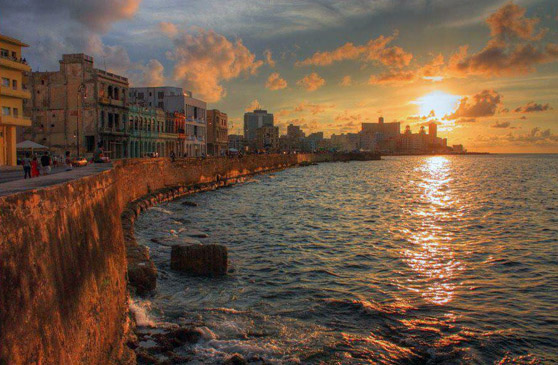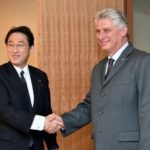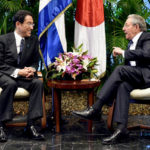
Japan then China take a trip to Cuba
Cuba is all the fashion. After Iranian President Hassan Rouhani visited Havana earlier this week, the prime minister of Japan and the Chinese premier are visiting the Caribbean island – an expression of Asia’s increased interest in Cuba.
On Thursday night (22.09.2016) Japan’s Prime Minister Shinzo Abe landed in Havana. The first-ever visit by a Japanese prime minister on the Caribbean island opens a new chapter in their bilateral relations, which were established in 1929. Most recently, in May last year, Foreign Minister Fumio Kishida visited Cuba shortly after the United States and Cuba began their rapprochement. In June this year, in turn, Cuban Vice President Miguel Diaz-Canel was in Tokyo.
Strong economic partner wanted
As in many other countries, the U.S.’ new Cuba policy and the new economic dynamism in Cuba initiated by President Raul Castro’s policy of economic openness sparked new interest in Cuba in Japan. Until then, ties were mainly focused on development cooperation.
While the rapprochement is proceeding more slowly than many expected – the U.S. blockade remains in force and the outcome of the US presidential elections in November is far from certain – the arrival of a strong business partner like Japan comes at just the right time for the troubled Cuban economy, hit by reduced oil deliveries from its ally Venezuela.
Just ahead of Abe’s visit, Cuba and Japan agreed to restructure Havana’s debt of around 1.5 billion euros ($1.67 billion). The deal is part of Cuba’s restructuring negotiations with the Paris Club and paves the way for Japanese loans and investment. What’s more, as part of his visit Abe will give Cuba medical equipment, the Japanese newspaper Nikkei reported. While this is officially being described as development assistance, it raises hopes to later export orders for medical technology. A teaching center for Cuban doctors will also be set up in which they are trained on Japanese technology. Alongside tourism and infrastructure projects, medical tourism is an area likely to be of particular interest to Japanese companies.
‘A market with potential’
Abe’s visit could open new doors to Japanese companies, which want to do business on the island. In July, the Mitsubishi group opened an office in Havana. “We are trying to find new business opportunities to establish some infrastructure projects … as well as new trading opportunities,” Mitsubishi’s senior vice president for global strategy told the Reuters news agency. The special economic zone established in Mariel just outside of Havana two years ago which provides tax advantages and other benefits to foreign investors is interesting because of its strategic location in the middle of the Caribbean between the US and the Panama Canal.
“From a logistics point of view, the Caribbean market has a big potential to grow,” Takada said.
Despite this small-scale diplomatic offensive, relations between Japan and Cuba are far from being as good as those between Havana and Beijing. After Venezuela, China is Cuba’s second-largest trading partner, albeit a distant second, and in some ways a model for Cuba’s economic reforms. Ideologically, the two countries are close.
The friend from Beijing
After Abe, Chinese Premier Li Keqiang is expected in Cuba in the next few days. The trip has been confirmed, but exact dates are not yet available. During the visit of Chinese President Xi Jinping in July 2014 some 30 agreements were concluded “raising relations to new heights.” These deals included health, biotechnology, education, agriculture, renewables, energy and tourism. The expansion of Cuba’s internet infrastructure is happening with Chinese technology. Since December 2015, there have also been direct flights between Beijing and Havana.
Trade between the two countries amounted last year to nearly 1.6 billion dollars – an increase of more than 50 percent compared with 2014. However, there are only a few Cuban-Chinese joint ventures, and at an estimated 410 million euros, Chinese direct investment has been relatively low, especially in the tourism sector, even if the trend is increasing.
China supports Cuba primarily with loans. In February two credit lines were agreed – they allow Cuba to purchase Chinese tractors for the rice harvest, as well as 240 railway wagons for transporting passengers. In addition, the cargo port of Cuba’s second largest city, Santiago de Cuba, is being expanded with Chinese funds – said to amount to more than 100 million dollars.
Economic agreements and cooperation agreements are once again likely to be key at the talks in Havana with Li Keqiang. Like Japan, China wants to strengthen its position in Cuba before the US blockade falls and US companies return to the Cuban market.
(From DW)





